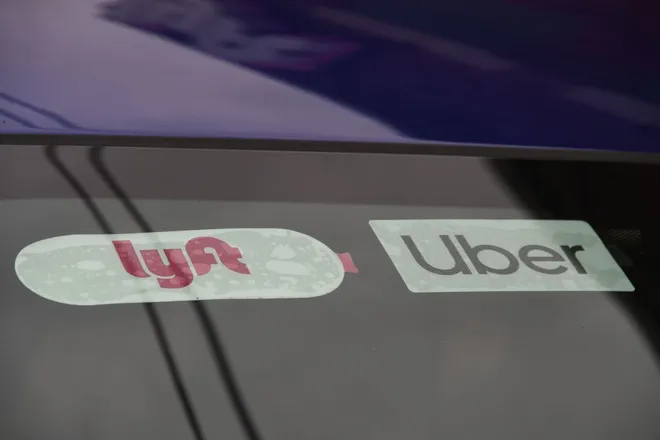Uber, Lyft say they'll leave Minneapolis if rideshare minimum wage ordinance passes. Here's why.

Uber and Lyft may be leaving Minneapolis by the end of the year if a new city council ordinance intent to protect drivers goes into effect.
The council passed the Transportation Network Companies (TNC) driver protection ordinance on Tuesday in a 7-5 vote, guaranteeing rideshare drivers a number of protections in the city, including a minimum wage. The edict grants drivers a minimum pay of $1.40 per mile and $0.51 per minute, which falls in line with actions other cities, like New York and Seattle, have taken in recent years.
Mayor Jacob Frey has power to veto the ordinance until next Wednesday, Aug. 23.
The action, like those passed in other states, has been met with backlash from some drivers, community members and the companies themselves, who have threatened to leave the city if the mandate goes into effective.
T-Swift, Beyoncé boost Uber:Beyoncé, Taylor Swift fans have boosted Uber demand as both artists tour across the U.S.
Uber and Lyft threaten to leave Minneapolis
In a statement provided to USA TODAY, Lyft contested that the changes would harm drivers and cause prices to skyrocket for customers. The bill, they said, had been “jammed through” with “little consideration for its consequences.”
“If it becomes law, drivers would ultimately earn less because prices could double and only the most wealthy could still afford a ride,” said the statement. “We support a minimum earning standard for drivers, but it should be part of a broader statewide solution that also protects driver independence.”
Lyft also said they’ve urged Mayor Frey to veto the bill and instead support the state rideshare task force which is currently conducting research.
“Otherwise, operating within Minneapolis would no longer be sustainable, and we would need to shut down within the city when the law takes effect on Jan. 1,” the statement concluded.
Lyft sent a more detailed letter directly to the council on Tuesday, laying their concerns out to members.
Uber expressed similar distaste for the bill, saying in a statement that the company was “disappointed” by the vote.
The company said they had supported a compromise earlier in the year that included higher pay, better insurance coverage and more transparency but that the Council had instead “passed a bill that will hurt riders and drivers, and did so without any discussion with the industry and other stakeholders.”
“As a result of the incredibly expensive rates set forth in the bill, if it becomes law, beginning December 31, we will no longer offer UberX in Minneapolis. We will only offer premium products, such as Uber Black and Uber SUV, to match the premium prices required by the ordinance,” Uber spokeswoman Freddi Goldstein said.
Uber also said that more than 700 drivers have sent the council and Mayor Frey emails asking them to oppose the bill.
Rent out your car? Uber says yes:Uber wants to rent out your car: Company set to launch Uber Carshare in Boston, Toronto
Drivers association, mayor chime in
The Minnesota Rideshare Driver’s Association (MRDA) also encouraged the mayor to veto the ordnance, calling it “ineffective and premature, as it does not address the problem of TNC drivers’ rights and responsibilities at the state level.”
MRDA listed a lack of occupational insurance, bans on the use of older vehicles, a lack of clarity as to worker status, lack of protections against unfair driver deactivation and failure to involve drivers and stockholders in decision making amongst their list of grievances.
“We deserve a livable income. Our current minimum take-home rate is $0.58 per mile and $0.14 per minute,” MRDA said in a statement to USA TODAY. “We need double of that to make ends meet. However, this is not just a matter between TNCs and drivers, but also between drivers and riders who pay for the services.”
Ally Peters, spokesperson from the Office of Mayor Frey, told USA TODAY that while the mayor supports drivers being paid more, he has “deep concerns with how the ordinance is written and the impact it will have.”
The office also provided a copy of the letter Frey sent the City Council yesterday, which outlines potential impacts he feels should be reviewed further.
In it, he told council members he believes additional data, time and conversations are needed before passage of such an ordinance. While Frey acknowledged in the letter that drivers need higher pay and better working conditions, he also said he wanted to avoid unintended policy consequences.
In May of this year, a similar bill was passed in the Minnesota Legislature but was vetoed by Gov. Tim Walz, who said the while rideshare drivers “deserve fair wages and safe working conditions," this was “not the right bill to achieve these goals."
Representatives from the Minneapolis City Council did not immediately respond to request for comment.
Disclaimer: The copyright of this article belongs to the original author. Reposting this article is solely for the purpose of information dissemination and does not constitute any investment advice. If there is any infringement, please contact us immediately. We will make corrections or deletions as necessary. Thank you.







